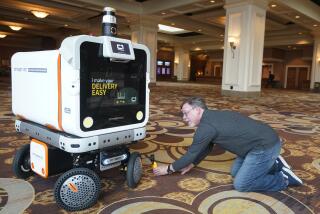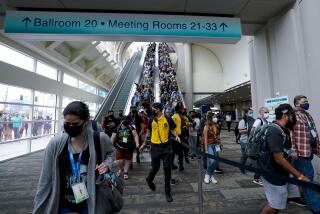Electronics Consumers to Attend Show for 1st Time
- Share via
This week’s Consumer Electronics Show in Chicago will feature a novel new ingredient: real, live consumers.
For the first time in its 25-year history, the semi-annual expo featuring the latest and greatest in TVs, stereos, video games, telephones and home computers will throw its doors open to the public. It’s an experiment that has sparked both excitement and trepidation among show participants.
“It’s an opportunity to educate consumers about the products and generate excitement,” says Gary Shapiro, vice president of the Electronic Industries Assn., which sponsors the show. “The consumer electronics industry is out there competing with other industries for shrinking disposable incomes,” he says, and thus must become more aggressive in its promotional efforts.
Clearly, the industry needs a shot in the arm. The recession and a lack of major new products such as the VCR have brought sales growth to a virtual halt. Many innovations now in the pipeline--from the two new digital recording formats, Digital Compact Cassette and Mini Disc, to Apple Computer’s “personal digital assistants”--are unlikely to make a major impact for several years.
Shapiro said the idea of allowing consumers into the show--a common practice at similar events in Europe and Japan--has been batted around for some time, and the EIA board of directors last year voted unanimously to give it a try.
Traditionally, exhibitions such as CES are designed to give manufacturers a chance to display their wares for retailers. And for the first two days of this year’s show, it will be business as usual, with attendance restricted to some 50,000 retailers and industry professionals.
An estimated 50,000 to 100,000 consumers are expected to swarm onto the floor of the huge McCormick convention center the final two days. No products will be for sale, but manufacturers will be able to gauge consumer interests and attitudes first-hand.
Admitting the public makes life more complicated for exhibitors, however. Some companies are unenthusiastic. At video game software vendor Electronic Arts, for examples, executives are anticipating hordes of children and other game enthusiasts descending on their booth with something close to dread.
And rank-and-file employees at many companies grumble that the bigger crowds and longer show hours will make the already draining job of manning the booths even more taxing.
But they don’t get any sympathy from the EIA’s Shapiro. “Anytime you change anything, there will be negative comments,” he says.
“People are going to have to work harder to make their sales in the 1990s.”






